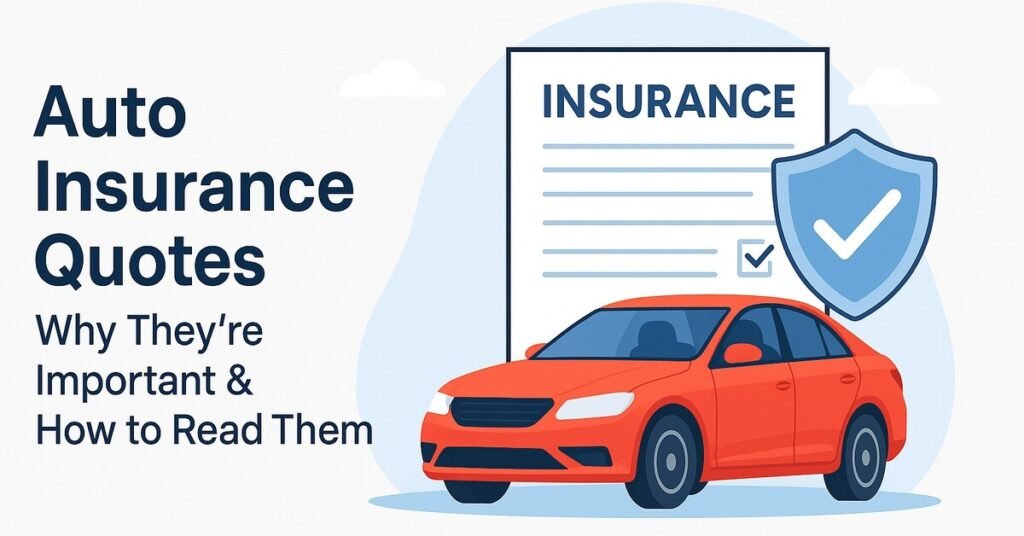Driving in the United States comes with both freedom and responsibility. One responsibility that every driver must take seriously is auto insurance. It not only protects you from unexpected financial burdens but is also a legal requirement in most states.
When you begin searching for car insurance, the first thing you encounter is an auto insurance quote. Understanding these quotes can feel confusing, especially with so many providers and plans. This article will explain why auto insurance is important, what exactly an auto insurance quote is, and how to read and compare quotes effectively to get the best coverage for your budget.
Why Auto Insurance is Important
Auto insurance isn’t just paperwork—it’s protection. Here are the top reasons why it matters:
1. Legal Requirement in Most States
Almost every US state requires drivers to carry a minimum level of liability coverage. Without insurance, you risk fines, license suspension, or even legal action.
2. Financial Protection Against Accidents
Car accidents can cost thousands of dollars in vehicle repairs, property damage, or medical bills. Insurance ensures you don’t have to bear these expenses alone.
3. Medical Coverage for You and Passengers
Many policies include coverage for medical expenses in case of injury during an accident. This provides peace of mind for you and your loved ones.
4. Coverage Beyond Accidents
Comprehensive insurance covers theft, fire, vandalism, and natural disasters. This keeps you financially secure in unexpected situations.
5. Compliance With Lenders and Leases
If you finance or lease your car, lenders often require full coverage (liability, collision, and comprehensive).
In short, auto insurance is a safety net that helps you drive confidently while protecting your finances.
What is an Auto Insurance Quote?
An auto insurance quote is an estimate of the premium you’ll pay for coverage. Insurance companies calculate it based on multiple factors, including:
- Personal Details: Age, gender, marital status
- Driving Record: Accidents, speeding tickets, and overall history
- Vehicle Type: Make, model, year, and safety features
- Location: ZIP code, city traffic, accident rates
- Credit Score: In many states, insurers consider credit scores as part of risk assessment
- Coverage Level: Liability-only vs. full coverage (collision + comprehensive)
Because every company uses its own formula, quotes vary widely. This is why experts recommend comparing multiple quotes before choosing a policy.
How to Read Auto Insurance Quotes
When you receive a quote online or from an agent, it usually has several sections. Here’s what each part means:
1. Premium
The total cost of your policy—monthly, quarterly, or annually.
2. Deductible
The out-of-pocket amount you pay before insurance kicks in. A higher deductible usually lowers your premium.
3. Liability Coverage
Covers damage to other people’s property or injuries you cause in an accident. This is the minimum legal requirement in most states.
4. Collision Coverage
Covers damages to your own vehicle after an accident, regardless of fault.
5. Comprehensive Coverage
Protects against theft, vandalism, fire, flood, or natural disasters.
6. Additional Options
- Roadside assistance
- Rental car reimbursement
- Gap insurance (important if you have a loan or lease)
👉 Tip: Don’t just look for the lowest premium—always check the coverage limits and exclusions.
How to Compare Auto Insurance Quotes
To make the best decision:
- Collect Multiple Quotes: Use comparison websites or request from at least 3–5 companies.
- Match Coverage Types: Ensure you compare similar policies (full coverage vs liability-only).
- Check Deductibles: A low premium may mean a high deductible, which could cost more later.
- Look for Discounts: Many insurers offer safe-driver, student, or multi-car discounts.
- Review Customer Service Ratings: Sometimes a slightly higher premium is worth it for better claims service.
Tips to Lower Your Auto Insurance Premium
- Bundle Insurance: Combine auto and home insurance for discounts.
- Maintain a Clean Driving Record: Avoid accidents and traffic violations.
- Increase Deductibles Wisely: If you can afford a higher out-of-pocket cost, you’ll pay less monthly.
- Improve Credit Score: In states where credit is considered, a better score means lower premiums.
- Review Annually: Rates change—compare quotes every year.
Frequently Asked Questions (FAQ)
Q1. Is the cheapest auto insurance always the best?
No. Cheap insurance often means limited coverage, which may leave you exposed during accidents.
Q2. How often should I get new quotes?
Experts recommend reviewing your policy annually or whenever your driving situation changes.
Q3. Does credit score affect insurance?
Yes, in many states it does. Insurers believe credit history is linked to risk level.
Conclusion
Auto insurance is more than a legal requirement—it’s an investment in your safety and financial stability. Understanding and comparing auto insurance quotes ensures you don’t just settle for the cheapest policy, but instead choose one that balances affordability with strong protection.
When you know why auto insurance is important and how to read quotes properly, you gain control over your coverage and your costs. Always compare multiple providers, look beyond the premium, and choose a plan that gives you peace of mind on the road.





